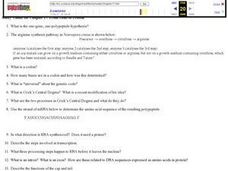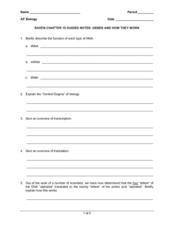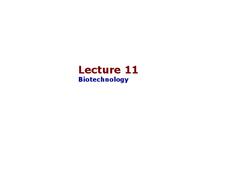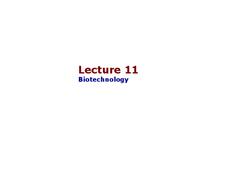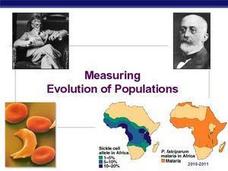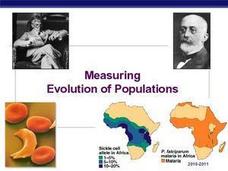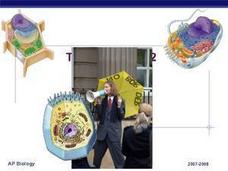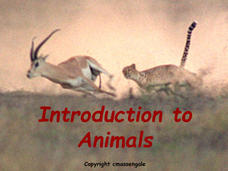Curated OER
From Gene to Protein
Here is a detailed presentation to assist in your lectures on the difficult topic of genetic transcription. The history, discovery, and scientific breakthroughs will spark interest. The last 15 slides deal with the biochemistry and...
Curated OER
Prokaryotes
They're everywhere! They're everywhere! Prokaryotes cover the Earth! Biology buffs survey the microscopic world of bacteria, including their general structure, metabolism, commercial uses, and diseases caused by pathogenic varieties....
Curated OER
Cellular Respiration Oxidation of Pyruvate Krebs Cycle
Diagrams with annotations are shown on each of these eighteen slides, which summarize the processes of respiration. The focus is on the 3-step oxidation process and the Krebs cycle. Students should be able to follow these slides...
Curated OER
Tour of the Cell 1
Each of these slides deals with an individual organelle and displays a diagram along with labels of the structures. The most useful components of this slideshow are the summaries of functions and descriptions of how the organelles are...
Curated OER
Taxonomy - The Science of Naming Organisms
Carolus Linnaeus designed the binomial nomenclature system of naming organisms that is still in use more than 200 years later. By viewing this PowerPoint, upcoming biologists learn how to use it. They are also introduced to the hierarchy...
Curated OER
Final Exam Practice - General Biology
A 17-page practice final exam for a college-level introductory biology course is contained in this resource. Matching and short answer questions cover every topic that you would expect to teach during an advanced biology course including...
Curated OER
7.012 F’04 Problem Set 1 ~ Biology
Course identification information is included in the upper left corner as well as within the title of this worksheet. If you overlook or remove that information, you are left with a tremendous college biology assignment. There are only...
Curated OER
From Gene to Protein Study Guide
In this biology worksheet, students review and answer different questions based upon the molecules of DNA and RNA. They look at the specific protein order of the DNA strand and its synthesis.
Curated OER
Raven Chapter 15 Guided Notes: Genes and How They Work
What does it take to produce all of the proteins that make up a living organism? An amazing series of events! Biology novices review the steps of protein synthesis by breaking down transcription and translation in detail. Colorful...
Curated OER
Biotechnology
The metaphors used here to describe the "cut and paste" procedures for genetic engineering will really help your biologists in their understanding of restriction enzymes and DNA. The uses of genes that are isolated and incorporated...
Curated OER
Biotechnology
The concepts here cover the gamut of biotechnological engineering. Information is given about plasmids and genetic manipulation. After reviewing genetic engineering, this slide show would be useful to recap some of the main procedures.
Curated OER
Measuring Evolution of Populations
The Hardy-Weinberg principle is the focus of this concise slideshow. Some vocabulary definitions are given on the first 2 slides, and the rest are given over to examples of the Hardy-Weinberg theorem. Calculations of the H-W...
Curated OER
Measuring Evolution of Populations
The five agents of evolutionary change are reviewed in this slideshow. Definitions of common terms involved with populations and equilibrium are given, and there are some presentations of Hardy Weinberg equations for common examples of...
Curated OER
Tour of the Cell 2
As your class views each slide, they will be introduced to the organelles and structure of the cell. Details about structure and function are given and also some trivia about their frequency and population. There is also some...
Lesson Plans
Analogy of the Cell Project
Intended to supplement your existing cell function and organelle lessons, pairs work together to develop a real-world analogy for cell structures. In addition to writing paragraphs about the comparison, each group will make a short...
Cmassengale
Bacteria: Structure and Function
For as small as they are, there sure is a lot of information for young scientists to learn about bacteria. Help simplify the subject with this instructional presentation that explores the structure, nutrition, and reproduction of...
Virginia Department of Education
Meiosis
Intrigue the class by completing a lesson on meiosis, filled with challenging and insightful activities to spark the interest of every person in the room. Each member of the class learns about genetic disorders due to faulty meiosis, and...
Intel
Cell-to-Cell
The third in a series of 10 STEM project-based lessons focuses on cells types, functions, and physiology. Through research, discussions, writings, and presentations, groups learn about the difference between plant and animal cells, the...
Biology Junction
Strawberry DNA
Humans eat around 93,205 miles of DNA in an average meal. Scholars learn how to extract DNA from a strawberry using a presentation. It walks through each step and explains why the process works. Comprehension questions encourage...
Biology Junction
Plant Diversity
Ginkgo trees existed for more than 350 million years, and, at this time, only one species still remains. While plant diversity generally increases over geologic time, some interesting exceptions occur. Young scientists learn about plant...
Biology Junction
Introduction to Animals
Out of all animals, elephants alone lack the ability to jump. Scholars learn all about animals using a presentation full of fun examples. It describes different types of animals, the biological similarities and differences between...
LABScI
Botany: The Plant Dissection Lab
Study everything about plants! The 12-part series of lessons continues with an examination of many aspects of plants. Components of the laboratory activity address the growth and structure of plants by evaluating familiar plants. The...
Howard Hughes Medical Institute
Spreadsheet Tutorial 4: t-Test
The t-test tutorial will fit your needs to a T. After calculating the mean, sum of squares, standard deviation, and variance of two data sets on a spreadsheet, scholars learn to calculate the t-values. They then learn to use the TTEST...
Howard Hughes Medical Institute
Spreadsheet Tutorial 3: Column Graphs, Error Bars, and Standard Error of the Mean
There's absolutely no error in using the tutorial! Learners use spreadsheets to create column or bar graphs with error bars. They also learn how to calculate the standard error of the mean in the tutorial. This is the third installment...







